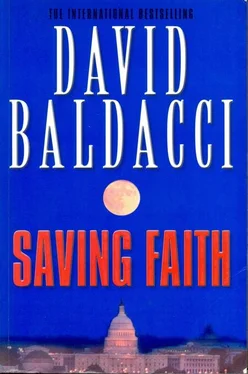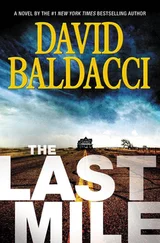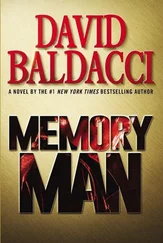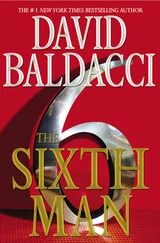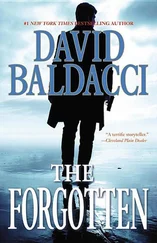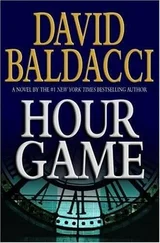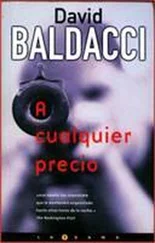David Baldacci - Saving Faith
Здесь есть возможность читать онлайн «David Baldacci - Saving Faith» весь текст электронной книги совершенно бесплатно (целиком полную версию без сокращений). В некоторых случаях можно слушать аудио, скачать через торрент в формате fb2 и присутствует краткое содержание. Жанр: Политический детектив, на английском языке. Описание произведения, (предисловие) а так же отзывы посетителей доступны на портале библиотеки ЛибКат.
- Название:Saving Faith
- Автор:
- Жанр:
- Год:неизвестен
- ISBN:нет данных
- Рейтинг книги:4 / 5. Голосов: 1
-
Избранное:Добавить в избранное
- Отзывы:
-
Ваша оценка:
- 80
- 1
- 2
- 3
- 4
- 5
Saving Faith: краткое содержание, описание и аннотация
Предлагаем к чтению аннотацию, описание, краткое содержание или предисловие (зависит от того, что написал сам автор книги «Saving Faith»). Если вы не нашли необходимую информацию о книге — напишите в комментариях, мы постараемся отыскать её.
Saving Faith — читать онлайн бесплатно полную книгу (весь текст) целиком
Ниже представлен текст книги, разбитый по страницам. Система сохранения места последней прочитанной страницы, позволяет с удобством читать онлайн бесплатно книгу «Saving Faith», без необходимости каждый раз заново искать на чём Вы остановились. Поставьте закладку, и сможете в любой момент перейти на страницу, на которой закончили чтение.
Интервал:
Закладка:
As the light of the fire played over the painting, the woman's face, it seemed to Buchanan, took on the characteristics of Faith Lockhart—not the first time he had observed this. His gaze traced the set of full lips that could turn petulant or sensual without warning. As his eye ran down the long, gracefully formed face, the hair golden, not auburn, in just the right splash of angled light, he always thought of Faith. She had a pair of eyes that held you; the left pupil slightly off center added depth to make Faith's countenance truly remarkable. And it was as though this flaw of nature had empowered her to see right through anyone.
He remembered every detail of their very first meeting. Fresh out of college, she had bounded into his life with the enthusiasm of a newly minted missionary, ready to take on the world. She was raw, immature at certain levels, largely ignorant of the ways of Washington, astonishingly naive in various respects. And yet she could also command a room like a movie star. She could be funny and then turn serious on a dime. She could stroke egos with the best of them and still get her message across, without overtly pushing the issue. After five minutes talking to her, Buchanan knew she had what it took to flourish in his world. After her first month on the job, his intuition proved correct. She did her homework, worked tirelessly, learned the issues, dissected the players down to the level needed to do the job and then went deeper. She understood what everyone needed in order to walk away a winner. Burning bridges in this town meant you didn't survive. Sooner or later, you needed help from everyone, and memories were exceptionally long in the capital city. As tenacious as a wolverine, she had endured defeat after defeat on a number of fronts, but continued to pound away until she was victorious. He had never met anyone like her before or since. They had been through more together in fifteen years than couples married a lifetime. She was really all the family he had. The precocious daughter he was destined never to have. And now? How did he protect his little girl?
As the rain drifted across the roof and the wind strummed its peculiar sounds down the aged firebrick of his Old Town chimney, Buchanan forgot about his car and his flight and the dilemmas confronting him. The man continued to stare at the painting in the soft glow of the quietly crackling fire. And it was clearly not the work of the grand master that fascinated him so.
Faith had not betrayed him. Nothing Thornhill could ever tell him would change that belief. But now she was in Thornhill's way, which meant she was in mortal danger. He stared at the painting. "Run, Faith, run just as fast as you can," he said under his breath, with all the anguish of a desperate father seeing violent death racing after his child. In the face of the protector mother in the painting, Buchanan felt even more powerless.
CHAPTER 12
Brooke Reynolds sat in rented office space about ten blocks from the Washington Field Office. The Bureau sometimes took off-site space for agents engaged in sensitive investigations, where something overheard even in the cafeteria or hallway could have disastrous effects. Virtually everything the Public Corruption Unit did was of a sensitive nature. The usual targets of the unit's investigation were not bank robbers wearing masks and waving guns. They were often people one read about on the front pages of the newspapers or saw being interviewed on the TV news.
Reynolds leaned forward and slipped out of her flats, rubbing her aching feet against the legs of her chair. Everything about her was tight, raw and hurting: Her sinuses were almost completely closed, her skin feverish, her throat scratchy. But at least she was alive. Unlike Ken Newman. She had driven straight to his home after first calling ahead to let his wife know she had to see her. Reynolds hadn't said why, but Anne Newman had known that her husband was dead. Reynolds had heard it in the tone of the few words the woman had managed to speak.
Normally, a person of a higher level than Reynolds would accompany her to the home of a bereaved spouse, to show that the Bureau did care, from top to bottom, when it lost one of its own. However, Reynolds had not waited for anyone else to volunteer to come with her. Ken was her responsibility, including telling his family that he was dead.
When she had arrived at the house, Reynolds had gotten right down to it, figuring a drawn-out monologue would only prolong the woman's obvious agony. Reynolds's compassion and empathy for the bereaved woman had been unhurried, however, and sincere. She had held Anne, consoled her as best she could, broken down in tears with her. Anne had taken the absence of information well, Reynolds had thought, far better than she probably would were the roles reversed.
Anne would be allowed to see her husband's body. Then it would be autopsied by the state's chief medical examiner. Connie and Reynolds would attend the post along with representatives from the Virginia State Police and the commonwealth's attorney office, all of whom were under strict confidentiality orders.
They would also have to count on Anne Newman to help keep angry and confused family members under control. It was a potentially weak link in the chain, expecting a woman in personal agony to help a government agency that couldn't even tell her all the circumstances of her husband's death. But it was all they had.
As she had left the stricken woman's home—the kids had been away with friends—Reynolds had the distinct feeling that Anne blamed her for Ken's death. And as Reynolds had walked back to her car she couldn't really disagree with that. The guilt Reynolds was feeling right now was like a crusty barnacle sunk into her skin, a free radical roaming inside her body, seeking a place to nest, grow and eventually kill her.
Outside the Newmans' home she had run into the director of the FBI as he had come to offer his own condolences. He conveyed heartfelt sympathy to Reynolds for the loss of one of her men. He told her that he had been briefed on her conversation with Massey and that he concurred in her judgment. However, he made it clear that results had better be both quick and substantial.
As Reynolds now eyed the considerable clutter of her office, it occurred to her that the mess well symbolized the disorganization, some would say dysfunction, of her personal life. Matters of importance from many open cases lay across her desk and small conference table. They were wedged onto her shelves, had mutated into piles on her floor and even found their way onto the couch where she often slept, far away from her children.
But for her live-in nanny and the nanny's teenage daughter, Reynolds didn't know how she could possibly keep a halfway normal life for her kids. Rosemary, a wonderful woman from Central America who loved the children nearly as much as Reynolds did and was fanatical about keeping the house clean, the meals cooked and the clothes laundered, was costing Reynolds over a quarter of her entire salary and was more than worth every penny. But after the divorce was final it would be very tight. And Reynolds's ex would not be paying any alimony. His work as a fashion photographer, though lucrative, came in quick bursts followed by long periods of deliberate inactivity. Reynolds would be lucky if she didn't end up paying him alimony. And child support from him, while she would seek it, would be a joke. The man may as well have had "dead-beat dad" engraved on his forehead.
She looked at her watch. The FBI lab was working on the videotape right now. Because the existence of her "special" was unknown within the FBI except for very select personnel, any lab work that was required was supposed to be sent over under a dummy case name and file number. It would be nice to have separate laboratory facilities and personnel, but that would entail enormous expense that just didn't figure in the Bureau's budget. Even elite crime fighters had to live within the allowance Uncle Sam gave them. Normally a liaison agent at the main agency would work with Reynolds's team to coordinate any lab submissions and findings with Reynolds. However, Reynolds didn't have time for normal channels. She had personally delivered the tape to the lab and with her superior's blessing it had received a very high priority.
Читать дальшеИнтервал:
Закладка:
Похожие книги на «Saving Faith»
Представляем Вашему вниманию похожие книги на «Saving Faith» списком для выбора. Мы отобрали схожую по названию и смыслу литературу в надежде предоставить читателям больше вариантов отыскать новые, интересные, ещё непрочитанные произведения.
Обсуждение, отзывы о книге «Saving Faith» и просто собственные мнения читателей. Оставьте ваши комментарии, напишите, что Вы думаете о произведении, его смысле или главных героях. Укажите что конкретно понравилось, а что нет, и почему Вы так считаете.
